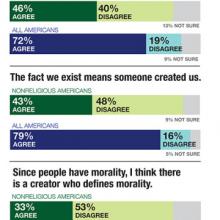apologetics

Image via Fixed Point Foundation / RNS
Before his death at 62, Christopher Hitchens, the uber-atheist and best-selling author of God is Not Great: How Religion Poisons Everything, considered becoming a Christian. That is the provocative claim of The Faith of Christopher Hitchens: The Restless Soul of the World’s Most Notorious Atheist, a controversial new book winning both applause and scorn while underscoring, again, the divide between believers and atheists Hitchens’ own life and work often displayed.

Image via LifeWay Research / RNS
You don’t have to believe in God or identify with any religion to see a creator’s hand in human life and morality, suggests a new survey.
LifeWay Research’s overall finding — that most Americans believe there is a creator who designed the universe and defines human morality — is not surprising. After all, 3 in 4 U.S. adults identify with a religious denomination.
The surprise is that so many people who don’t identify with a religion — so-called nones — agree.
British novelist and essayist Francis Spufford’s spirited defense of the Christian religion is in some ways like eavesdropping on a missionary conversation with the pagans of antiquity.
Unapologetic: Why, Despite Everything, Christianity Can Still Make Surprising Emotional Sense — is the latest attempt at an ancient literary form, the Christian apology, and it makes its appearance in the United States more than a year after it was published in England.
Spufford’s defense of Christianity is aimed primarily at what he calls “godless Europeans,” the post-Enlightenment elites who tend to regard religion with bemusement as a silly fairy tale, if not with open hostility as a dangerous superstition.
Pope Francis on Tuesday released his first apostolic exhortation since his election in March. The message, “Evangelii Gaudium” (“The Joy of the Gospel”), challenges Catholics — both laity and clergy — to pay more attention to evangelizing the world.
While most American evangelicals do not usually read papal pronouncements, it would be a shame if we did not familiarize ourselves with Francis’ newest document, for there is much in it that evangelicals could embrace:

